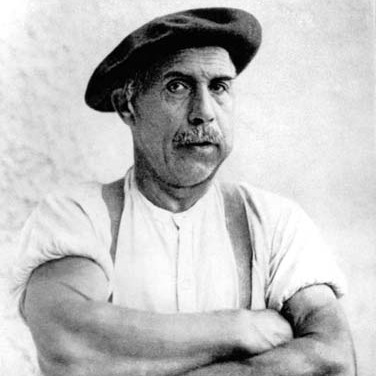- Surname:
- Wölfli
- First name:
- Adolf
- Era:
- 19th century
20th century - Field of expertise:
- Fine arts
- Place of birth:
- Bowil (CHE)
- * 29.02.1864
- † 06.11.1930

Wölfli, Adolf
Swiss painter, writer, composer and asylum inmate.
Adolf Wölfli (1864–1930) was born in Höchstetten (Switzerland) as the seventh child of stone mason Jakob Wölfl and his wife Anna, a washerwoman. The family lived in poor conditions; the father had a drinking problem, committed thefts and left his family in 1870. When the mother died three years later, Wölfli learned about this only after months. He worked as a “Verdingbub” (indentured child labourer), day labour and farmhand on farms in the cantons of Bern and Neuchâtel until 1889. After the attempted sexual abuse of two girls, he served a prison sentence in St. Johannsen penitentiary in 1890/92. After his release, he became increasingly lonely and in 1895 – following the attempted abuse of a small child – he was declared a “danger to the public” and permanently committed to Waldau cantonal asylum near Bern with the diagnosis “dementia paranoides”.
Life and art at the asylum
Isolated in a solitary cell for violence, Wölfli began his artistic work there in 1899. His first surviving drawings date from 1904, and he created more than 3.000 drawings and collages as well as 25.000 pages with texts, poetry and compositions over the course of 30 years. Between 1908 and 1916, Wölfli wrote his imaginary autobiography and travelogue Von der Wiege bis zum Graab (From the Cradle to the Grave); from 1917 onwards, he also composed music (Trauermarsch [Funeral March], 1928–1930). His attending doctor Walter Morgenthaler made him known to the public in his 1921 book Ein Geisteskranker als Künstler (A Psychiatric Patient as Artist). Adolf Wölfli died of gastric cancer in November 1930 at Waldau asylum.
His drawings were exhibited in 1948 by Jean Dubuffet at the Compagnie de l’Art Brut in Paris. Wölfli is considered one of the most productive artists of the 20th century in the context of psychiatry. The Adolf-Wölfli-Stiftung, founded in 1975, is taking care of his estate.
Literature
Adolf-Wölfli-Stiftung (2006): Adolf Wölfli. Bern: Adolf-Wölfli-Stiftung.
Aeberhard, S., C. Battegay, S. Leuenberger (2014): DialÄktik. Zurich: Chronos.
Baumann, D., Adolf-Wölfli-Stiftung (1996): Adolf Wölfli im Lauf der Zeit. Eine Rezeptionsgeschichte. 1921–1996. Basel: Wiese.
Baumann, D., M. Brunner (2002): Kopfreisen Jules Verne, Adolf Wölfli und andere Grenzgänger. Frankfurt/Main: Revolver.
Chanfrault-Duchet, M.-F. (1998): Adolf Wölfli. Autobiographie und Autofiktion. Freiburg im Breisgau: Rombach.
Gehbauer Tichler, U. (1999): Ein Diener Gottes ohne Kopf. Eine linguistische Untersuchung zur Transparenz von Adolf Wölflis Erzählwerk. Berlin: Lang.
Glaesemer, J., E. Spoerri, Adolf-Wölfli-Stiftung (eds.) (1987): Adolf Wölfli. Zeichnungen 1904–1906. Stuttgart: Hatje.
Haselbeck, H. (2014): Adolf Wölfli zu seinem 150. Geburtstag. In: Sozialpsychiatrische Informationen 44 (3), pp. 3–5.
Hunger, B. (1993): Portrait eines produktiven Unfalls. Adolf Wölfli. Dokumente und Recherchen. Frankfurt/Main: Stroemfeld, Nexus.
Morgenthaler, W. (1921): Ein Geisteskranker als Künstler. Bern: Bircher.
Perret, R. (2013): Moderne Poesie in der Schweiz. Zurich: Limmat.
Spoerri, E. (1976): Adolf Wölflis Erzählwerk. In: G. Hofer, K. P. Kisker (eds.): Die Sprache des Anderen. Basel: Karger, pp. 164–177.
Spoerri, E., Adolf-Wölfli-Stiftung (1976, eds.): Adolf Wölfli. Exhibition Catalogue. Bern: Kunstmuseum.
Spoerri, E., J. Glaesemer (1976): Adolf Wölfli. Werke aus einer Privatsammlung. Exhibition Catalogue. Bern: Kunstmuseum.
Spoerri, E., M. Wechsler, Adolf-Wölfli-Stiftung (1991, eds.): Adolf Wölfli. Geographisches Heft No. 11. Stuttgart: Hatje.
Spoerri, E. (2003, ed.): Art of Adolf Wölfli. St.Adolf – Giant – Creation. Princeton: Princeton University Press.
Surhone, L. M., M. T. Tennoe, S. F. Henssonow (2010): Adolf Wölfli. Beau Bassin-Rose Hill: Betascript.
Wismer, B., S. Kunz, I. Erhard (1997): Berge Blicke Belvedere. Kunst in der Schweiz von der Aufklärung bis zur Moderne. Ostfildern-Ruit: Hatje.
Wölfli, A. (1895): Kurze Lebensbeschreibung. In: W. Morgenthaler: Ein Geisteskranker als Künstler. Bern: Bircher, pp. 95–104.
Wölfli, A., Adolf-Wölfli-Stiftung (eds.) (1985): Von der Wiege bis zum Graab. Writings 1908–1912, 2 vols. Frankfurt/Main: Fischer.
Wölfli, A., Adolf-Wölfli-Stiftung (1996): Adolf Wölfli. Schreiber, Dichter, Zeichner, Komponist. Basel: Wiese.
Wölfli, A. (1998): Adolf Wölfli. Die Schenkung Ernst und Maria Elisabeth Mumenthaler-Fischer. Exhibitions at Kunstmuseum, Museum Schloß Moyland and Kunsthalle Tübingen. 1998–2000. Basel: Schwabe.
Wölfli, A., D. Baumann (1998): Adolf Wölfli. 1864–1930. Exhibition Catalogue Rome and Milan. Rome: De Luca.
Zemankova, T. (2013, ed.). Adolf Wölfli. Creator of the Universe. Revnice: Arbor Vitae.
Robin Pape, Burkhart Brückner
Photograph: Mutz / Source: Wikimedia / public domain.
Referencing format
Robin Pape, Burkhart Brückner (2015):
Wölfli, Adolf.
In: Biographisches Archiv der Psychiatrie.
URL:
biapsy.de/index.php/en/9-biographien-a-z/305-woelfli-adolf-e
(retrieved on:04.07.2025)
